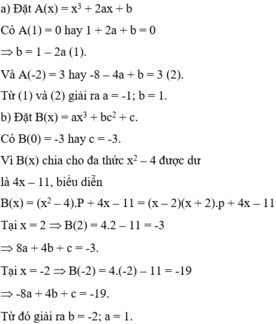Đa thức A(x)=x3-2x2+x-m+2 chia hết cho B(x)=x+3 có số dư=5
Hãy nhập câu hỏi của bạn vào đây, nếu là tài khoản VIP, bạn sẽ được ưu tiên trả lời.



b: \(=\dfrac{2x^4-2x^3-2x^2-3x^3+3x^2+3x+x^2-x-1}{x^2-x-1}\)
\(=2x^2-3x+1\)

b: Ta có: f(x):g(x)
\(=\dfrac{x^3-2x^2+3x+a}{x+1}\)
\(=\dfrac{x^3+x^2-3x^2-3x+6x+6+a-6}{x+1}\)
\(=x^2-3x+6+\dfrac{a-6}{x+1}\)
Để f(x):g(x) là phép chia hết thì a-6=0
hay a=6

a: Thay a=3 vào f(x), ta được:
\(f\left(x\right)=x^3-2x^2+3x+3\)
\(\dfrac{f\left(x\right)}{g\left(x\right)}=\dfrac{x^3-2x^2+3x+3}{x+1}\)
\(=\dfrac{x^3+x^2-3x^2-3x+6x+6-3}{x+1}\)
\(=x^2-3x+6-\dfrac{3}{x+1}\)

d: Ta có: f(x):g(x)
\(=\dfrac{x^3-2x^2+3x+5}{x+1}\)
\(=\dfrac{x^3+x^2-3x^2-3x+6x+6-1}{x+1}\)
\(=x^2-3x+6+\dfrac{-1}{x+1}\)
Để f(x) chia hết cho g(x) thì \(x+1\in\left\{1;-1\right\}\)
hay \(x\in\left\{0;-2\right\}\)

Bài 1:
Ta có: \(5x^3-3x^2+2x+a⋮x+1\)
\(\Leftrightarrow5x^3+5x^2-8x^2-8x+10x+10+a-10⋮x+1\)
\(\Leftrightarrow a-10=0\)
hay a=10

\(a,\Leftrightarrow4x^3-2x^2+a=\left(2x-3\right).a\left(x\right)\)
Thay \(x=\dfrac{3}{2}\Leftrightarrow4.\dfrac{27}{8}-2.\dfrac{9}{4}+a=0\)
\(\Leftrightarrow\dfrac{27}{2}-\dfrac{9}{2}+a=0\\ \Leftrightarrow a=-9\)
\(b,\Leftrightarrow3x^3+2x^2+x+a=\left(x+1\right).b\left(x\right)+2\)
Thay \(x=-1\Leftrightarrow-3+2-1+a=2\Leftrightarrow a=4\)

Ta có A(x) chia cho B(x) có số dư là 5
=> A(x) = C(x). (x+3) + 5
=> A(-3) = 5 => (-3)3 + 2.(-3)2 + (-3) + 2 - m=5
=>(-10) - m =0 => m = -10
bạn có thể chia theo côt dọc có được không